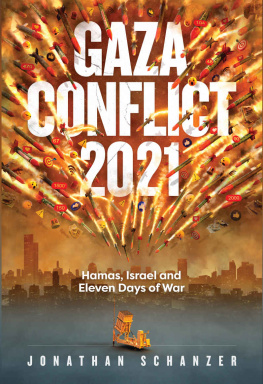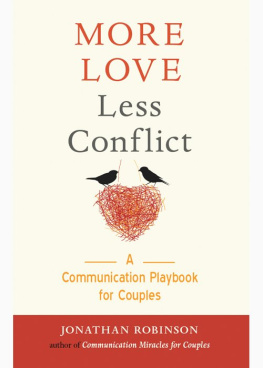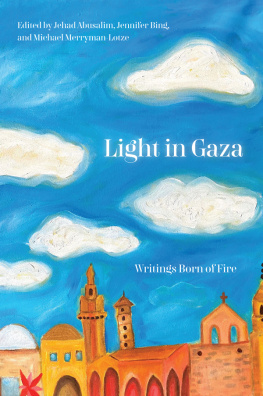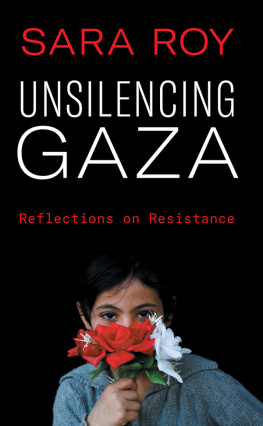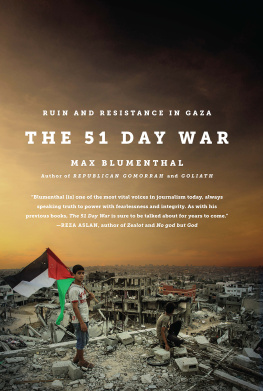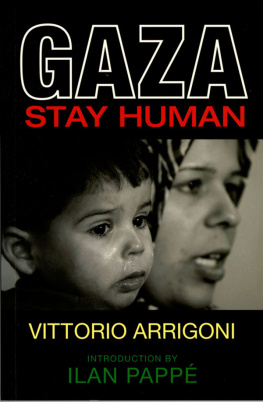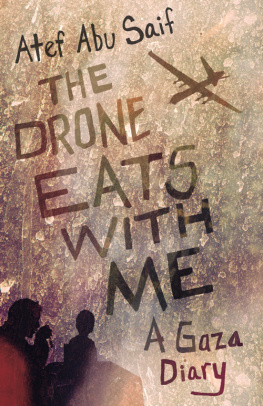Jonathan Schanzer - Gaza Conflict 2021
Here you can read online Jonathan Schanzer - Gaza Conflict 2021 full text of the book (entire story) in english for free. Download pdf and epub, get meaning, cover and reviews about this ebook. year: 2021, publisher: FDD Press, genre: Politics. Description of the work, (preface) as well as reviews are available. Best literature library LitArk.com created for fans of good reading and offers a wide selection of genres:
Romance novel
Science fiction
Adventure
Detective
Science
History
Home and family
Prose
Art
Politics
Computer
Non-fiction
Religion
Business
Children
Humor
Choose a favorite category and find really read worthwhile books. Enjoy immersion in the world of imagination, feel the emotions of the characters or learn something new for yourself, make an fascinating discovery.
- Book:Gaza Conflict 2021
- Author:
- Publisher:FDD Press
- Genre:
- Year:2021
- Rating:4 / 5
- Favourites:Add to favourites
- Your mark:
- 80
- 1
- 2
- 3
- 4
- 5
Gaza Conflict 2021: summary, description and annotation
We offer to read an annotation, description, summary or preface (depends on what the author of the book "Gaza Conflict 2021" wrote himself). If you haven't found the necessary information about the book — write in the comments, we will try to find it.
Gaza Conflict 2021 — read online for free the complete book (whole text) full work
Below is the text of the book, divided by pages. System saving the place of the last page read, allows you to conveniently read the book "Gaza Conflict 2021" online for free, without having to search again every time where you left off. Put a bookmark, and you can go to the page where you finished reading at any time.
Font size:
Interval:
Bookmark:

Gaza Conflict 2021: Hamas, Israel and Eleven Days of War
Copyright 2021
All rights reserved.
Library of Congress Control Number: 2021917924
ISBN (hardback): 978-1-956450-01-9
ISBN (ebook): 978-1-956450-02-6
Cover illustration by Daniel Ackerman

Publication by FDD Press, a division of the Foundation for Defense of Democracies (FDD).
FDD is a Washington, DC-based nonpartisan 501(c)(3) research institute focusing on foreign policy and national security. For more information, please visit fdd.org.
INTRODUCTION
I first visited the Gaza Strip in 1998. Back then, I was a dark-haired graduate student at the Hebrew University of Jerusalem. After seven years in the workforce, I had decided to devote my career to the study of the Middle East. As I set about learning the languages, history, and culture of the region, I felt compelled to visit as much of it as I could. Gaza was remarkably close to my apartment perhaps two hours away. Yet it felt like another world. Despite the US-led peace process, the territory had become a stronghold of the terrorist group Hamas. In large part, that was what drew me to the place.
It was not long before I met a Palestinian man from eastern Jerusalem who said he could take me and a few classmates to Gaza from an agreed upon spot just outside the Damascus Gate of the Old City. We met him there early on a Sunday morning, boarded a minibus, and started off. Before we had even left Jerusalem, he warned our small group not to stray, not to mention Israel, and not ever to speak a word of Hebrew one of the two languages most of us were studying at the time. We all nodded in agreement, then looked at one another, wondering exactly what we had just gotten ourselves into.
As the minibus entered Gaza, there was an immediate change in scenery. The signs changed from Hebrew to Arabic. It was dustier. It was poorer. The streets were crowded. I distinctly recall Hamas graffiti on the walls. One spray-painted message featured a large Israeli flag with a knife lodged in it. That prompted more nervous glances inside the minibus.
The day was both memorable and enjoyable. We took turns taking photos next to a sign that said, Welcome to Gaza. We walked the streets of Gaza City. Children descended upon our small group, imploring us to take their pictures. We went to a school operated by the United Nations Works and Relief Agency, where children once again jostled to get into the middle of the photos we snapped. We went shopping. We went to a church. We visited an association that cared for Gazans injured during the First Intifada the Palestinian uprising of 1987 that ultimately paved the road for the establishment of the semi-independent Palestinian Authority (PA), which at the time of our visit could barely control the Gaza Strip. Of course, one would not know that based on the ubiquitous signs featuring the smiling face of then-PA President Yasser Arafat.
We drove by the sea the same sea in which Israelis were swimming just a few miles north. Our guide took us to Israeli settlements, which were roundly derided by the Gazans we met nearby. The Israeli buildings, considerably better built than the surrounding structures and guarded by Israeli soldiers, would seven years later be uprooted as part of a unilateral Israeli withdrawal that would open the political and security vacuum that enabled Hamas to conquer the Gaza Strip in 2007.
By the time I completed my studies and returned home to America, Gaza was no longer a place I could visit. The Second Intifada had erupted. Launched in 2000, this was less of a popular uprising and more of a war. Gaza had become a hotbed of Hamas terrorist activity.
In the years since, I have thought often about that trip to Gaza. The territory has come under the complete control of Hamas. In fact, one can argue that Hamas is the sovereign. It controls the borders, at least in terms of determining who can enter and exit (imports and exports are still controlled by Israel and Egypt). It has a functioning government with a monopoly on the use of force; other terrorist groups operate openly in Gaza, but with Hamas permission. Gaza is a breakaway republic, no longer part of the PA. For Israel, Gaza has become a problem from hell.
Though Israel is a far superior military power, there is no clear military solution to the Hamas threat. Israelis have no appetite for retaking the enclave or for utterly vanquishing the group. Yet wars continue to erupt between Israel and Hamas on a regular basis. Hamas starts them. Israel finishes them. The skirmishes draw intense attention from the international media and from zealous partisans on both sides of the Palestinian-Israeli divide.
Writing a book in this crowded space is never easy. I have written several over the years, and they have received equal parts praise and criticism. Yet after the most recent war between Hamas and Israel in May of 2021, I felt compelled to write another.
This is not a book about whether Hamas is or is not a terrorist organization. According to US law, it is. Many other governments around the world agree with that assessment.
Nor is this book about whether Israel is a valuable, democratic ally of the United States. It is. Every US president since Israels founding has attested to this. So have most legislators. This reflects a broad consensus among the American people, too.
This book will also avoid the unproductive debates about whether Israel is justified in its military control over the West Bank or in its de facto control over the borders surrounding the Gaza Strip. There are hundreds, even thousands, of analyses on this topic. It is unclear whether any of them will ever settle the dispute. A solution to the conflict is ultimately up to the Palestinians and Israelis themselves. This is not to imply that Israel doesnt have important choices to make about its policy toward the Palestinians and their national project. It does. But that is another book for another time.
This book is about the 2021 conflict between Israel and Hamas. That war was the fourth between these two bitter foes. The Israelis called it Operation Guardian of the Walls. Hamas called it The Battle of the Sword of Jerusalem. The conflict lasted for 11 days during the month of May. This book aims to explain that war, with the benefit of hindsight, better than it was explained at the time.
After the war concluded, it dawned on me that I monitored this conflict more closely than any of the previous ones during my career. This was not a reflection of greater interest. Rather, it was a matter of available technology. Thanks to smartphone and smart television technology, I was able to track a flood of news updates in several languages and watch multiple Middle Eastern television broadcasts in real time from my home in suburban Washington, DC. Thankfully, over the previous year of isolation during the COVID-19 crisis, I had decided to brush up on the Middle Eastern languages I learned in graduate school.
During those 11 days, I worked the phones, talking to officials in the United States, Israel, and several Arab governments. They invariably offered interesting insights not covered by the media. I also talked to journalists who were digesting off-the-record statements by Biden administration officials. Those conversations often helped me better understand the daily reports churned out by newspapers and websites the world over.
Perhaps it goes without saying, but I did not sleep much during those 11 days. By the time I would have normally gone to bed, Israelis and Gazans were starting their days anew, with fresh news from the front. These reports usually started to air around midnight Eastern Standard Time. For some reason, I felt compelled to understand the current state of play before trying to catch a few winks. After that, I often laid awake in bed, scrolling in the dark through my Twitter feed, watching the war unfold thousands of miles way.
Font size:
Interval:
Bookmark:
Similar books «Gaza Conflict 2021»
Look at similar books to Gaza Conflict 2021. We have selected literature similar in name and meaning in the hope of providing readers with more options to find new, interesting, not yet read works.
Discussion, reviews of the book Gaza Conflict 2021 and just readers' own opinions. Leave your comments, write what you think about the work, its meaning or the main characters. Specify what exactly you liked and what you didn't like, and why you think so.

